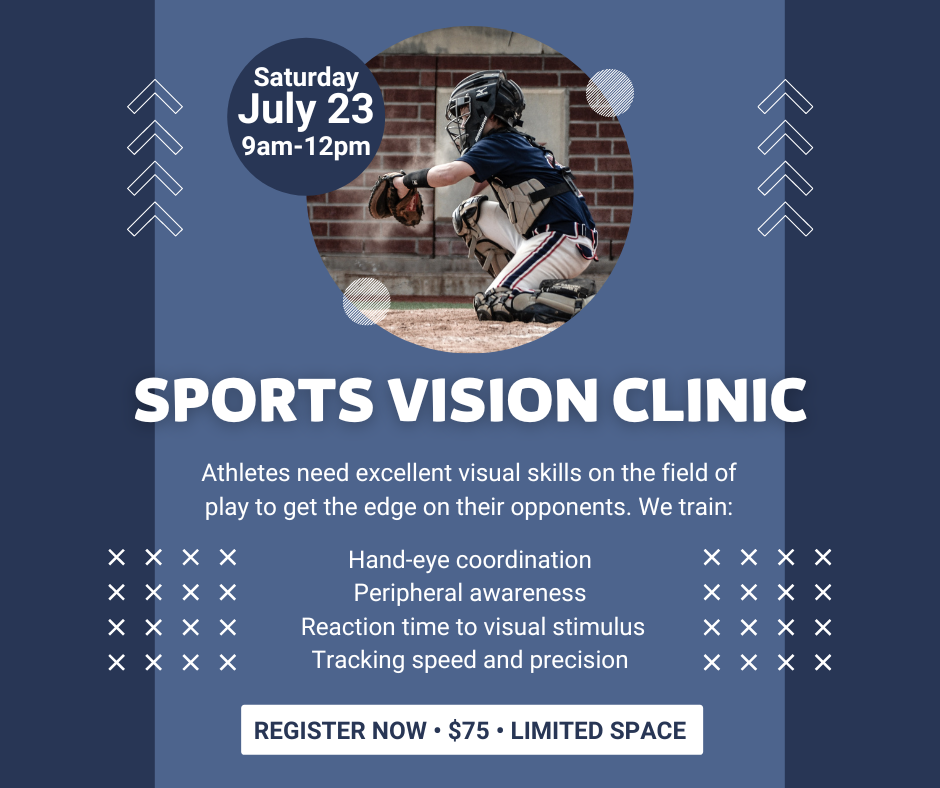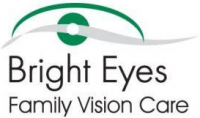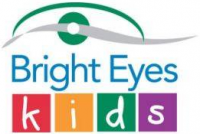 Welcome to The Bright Eyes Podcast: Advice for Healthy Vision for All Ages. Your hosts are Dr. Nate Bonilla-Warford & Dr. Beth Knighton, residency-trained optometrist that provide eye exams for glasses and contacts, and specialty services including vision therapy, myopia control, orthokeratology, and sports vision training. Their mission to empower patients by providing the best in friendly, professional, and individualized eye care.
Welcome to The Bright Eyes Podcast: Advice for Healthy Vision for All Ages. Your hosts are Dr. Nate Bonilla-Warford & Dr. Beth Knighton, residency-trained optometrist that provide eye exams for glasses and contacts, and specialty services including vision therapy, myopia control, orthokeratology, and sports vision training. Their mission to empower patients by providing the best in friendly, professional, and individualized eye care.
In this episode, Dr. Beth talks about Sports Vision with Bright Eye's own Chelsea Lewis.
You can listen in the player below or read the transcript. The show is available via Stitcher, iTunes, and the webplayer below. You can find all previous episodes here. If you have any questions or suggestions for future episodes, please email office@BrightEyesTampa.com.
Full Transcript:
Intro (00:10):
Welcome to the Bright Eyes Podcast: advice for healthy vision for all ages. Your hosts are Dr. Nate Bonilla-warford and Dr. Beth Knighton, residency trained optometrists providing eyecare to all ages with exams, for glasses and contacts and specialty services, including vision therapy, myopia control, orthokeratology, and sports vision training. Their mission is to empower patients by providing the best in friendly professional and individualized eyecare care
Dr. Beth (00:39):
From the amazing Tampa bay. It is the bright eyes podcast. This is episode number 19, and I'm Dr. Beth Knighton.
Chelsea (00:47):
I'm I'm Chelsea Lewis, a vision therapist at bright eyes.
Dr. Beth (00:50):
So today we're really excited to share with you about sports, vision training and all the dynamic visual skills that are needed for the different sports. And we are really lucky because we are talking to you from the beautiful Tampa, Florida, which we have adopted the nickname Tampa bay, because the Tampa bay Lightning have won back to back Stanley Cups in 2020 and 2021. And they're in the playoffs right now. And the Buccaneers won Superbowl 50 at home, and then the Tampa Bay Rays were American League champs in 2020. So we've got a lot going on here in Tampa, and we are so excited to kind of incorporate our love for sports and our love for vision all together.
Chelsea (01:30):
Yes. So I think we should start off by telling everyone what sports vision training is. As many of, you know, athletes know they need to train their body with weightlifting or running drills and cardio exercise, but many athletes neglect to train their visual skills, which could be putting them at a disadvantage.
Dr. Beth (01:47):
You know, for some athletes, sports vision training is working on areas of weakness in order to make improvements. But for the vast majority of athletes, we are taking them at their average visual skills and taking them up to excellent visual skills. If you have an average skill, that's usually not enough to progress in your sport to elite levels. And this is across the board from cardio to hand eye coordination to the visual skills.
Chelsea (02:14):
So also it's important to mention that any athlete in any sport at any level can benefit from sports vision training. We're talking about little league baseball, first basemen, middle school soccer, midfielder, high school football quarterback, college basketball, forwards, amateur adult tennis players, professional hockey goers, and even umpires at any level. Our team at Bright Eyes Family Vision Care has worked with athletes at every level.
Dr. Beth (02:40):
And there's also lots of examples of famous pros. Who've included vision training in their preparation. Larry Fitzgerald is an 11 time pro bowl wide receiver for the Arizona Cardinals. And he has done a lot of vision training, especially early in his career. Steph Curry, who is a three time NBA champion is known for all of his visual and cognitive training that he does. Jarvis Landry is a five time pro bowl wide receiver. Who's now with the new Orleans saints. And he does a lot of work with S stroboscopic glasses and other vision training. And Kauai Leonard is a two time NBA champion forward. And these are just some of the famous people who are using sports vision training to progress their career. And this sports vision training really goes through all the different levels. So college teams are using this now, minor league teams, major league teams. It's really across the board in sports. This is making a big difference in their athletes.
Dr. Beth (03:44):
So what are we gonna be looking for when we evaluate someone for sports vision? So the first step is making sure that the athlete can see clearly for distance and for up close. So most athletes actually have better than 2020 vision. And if your athlete needs vision correction, there's actually a lot of options. There are sports vision goggles and contact lenses. And if they're the right age in candidate, maybe refractive surgery like LASIK, there are also overnight contact lenses that can be used to help correct the vision during the day. So that's the first step you have to see clearly, and not just average clearly, but really that elite level of clarity at that 2015 or even 2010 vision. Next, we're gonna test the visual skills to see how well the two eyes work together, how well the eyes can adjust, focus from one distance to another, how well the eyes can move and track objects in motion and how well the athlete interprets all this information from their peripheral vision.
Dr. Beth (04:45):
Our brain is taking in all the information, processing it, and then making a decision about how to move our feet, how to move our hands, how to move our body in reaction to that. So we want that process to be as fast and efficient as possible. We're also looking at how well the athlete can pay attention to multiple things at the same time, how quickly the brain can process that information, and then how easily the brain can store and recall short-term memory. We use all of this data to customize a training program for each athlete. We're looking at a lot of different skills. So I just wanted to kind of highlight a few. The first is visual acuity. We talked about this just a second ago about that. We really need to see the very small details, the 2015 or better vision, but there's two different ways that we look at visual acuity.
Dr. Beth (05:36):
There's static visual acuity, which is when the athlete and what they're looking at are both stationary and dynamic visual acuity, which is when the athlete and the object are in motion. For most sports dynamic. Visual acuity is really the key here. So an athlete may have 20/15 static visual acuity, but when things start moving, maybe their dynamic visual acuity is only 20/30 or 20/40. So we wanna boost that so they can be able to process the information while they are moving. Another skill that's really important is depth perception. This is the ability to accurately judge the distance of objects and how that relates to where the athlete is. Standing in. Baseball depth perception is really important for batters because they need to know exactly when to swing, to make contact with the ball, but outfielders need the best depth perception of anyone on the field, because they are judging balls that are in an arc out towards them, knowing where they need to stand on the field in order to be exactly at the ball's trajectory.
Dr. Beth (06:42):
They also need to be able to accurately throw the ball to make the play. And so their depth perception not only needs to be accurate, but able to adjust with a moving target. Another skill that we look at is contrast, sensitivity and contrast is the ability to detect an object with various backgrounds. One example of using our contrast sensitivity is a golfer. Who's trying to read the green when they're putting the very subtle differences in the color of the green can tell them where there's a break and tell them where they need to put. So the contrast sensitivity is extremely important for golf. Another skill is peripheral awareness. So this is being able to notice things out of the corner of your eye and for sports like lacrosse or soccer, we need to be able to use our central vision, to see the details of things, but also have awareness of our periphery so that we can see the ball, see our teammates, see the opponents, see the goal, and we need to be able to process all of that information.
Dr. Beth (07:46):
Simultaneously. Another skill that we look at is visual concentration, and this is the ability to focus attention on a task or multiple tasks simultaneously. So if you think about in basketball, you get a breakaway, you're dribbling, you're paying attention to where you are on the court, but you're also noticing the people around you and maybe you're coaches, and maybe your coach is signaling to you from the sideline. You need to be able to look at all of that at once and know what's the important things to pay attention to. If you get distracted by something that's not important, it could take your eyes off the ball or take your eyes off the goal, and you may miss your shot.
Chelsea (08:24):
So if any of you are interested in sports vision training for either you or your child, again, this can be for any athlete at any level, check out our webpage, bright eyes, tampa.com, or call to speak with one of our vision training experts at 813-792-0637. We'd love to set up a consultation to discuss how vision training can improve your skills in your specific sport,
Outro (08:49):
Brought to you by Bright Eyes Family Vision Care and Bright Eyes kids. Find previous episodes and more detailed information at BrightEyesTampa.com. Creative Commons Copyright attribution Noncommercial use. The only purpose of this podcast is to educate and to inform. It is no substitute for professional care by a doctor experienced in the area you require. This podcast is provided on the understanding that it does not constitute medical or other professional advice or services. Please consult your position for diagnosis and treatment.
Intro/outro music: Lucas Warford of Three For Silver.

